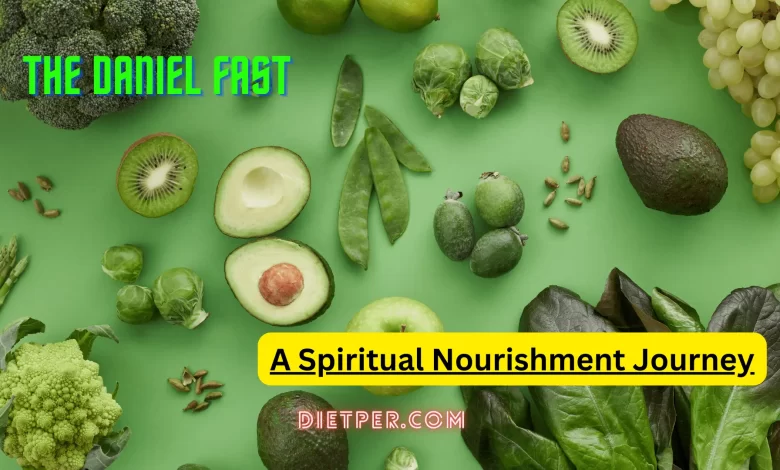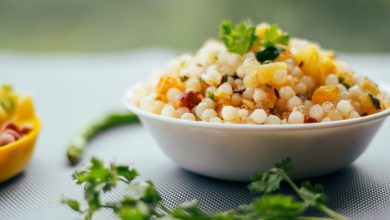Loving The Daniel Fast : A Spiritual Nourishment Journey
Embracing the Daniel Fast: A Journey of Spiritual Renewal and Nourishment

The Daniel Fast is a 21-day spiritual fast that is based on the biblical account of Daniel. This fast is typically observed by Christians who want to deepen their relationship with God and improve their physical and spiritual health. During the fast, participants avoid all animal products, processed foods, and sweeteners and instead focus on whole and nutritious foods. Meal planning can be a challenge on this fast, but with the right guidance and recipes, you can create delicious and nutritious meals that will keep you satisfied throughout the day.
What is Daniel diet plan?
The Daniel Diet Plan, often referred to as the Daniel Fast, is a religious dietary regimen based on the biblical account of Daniel and his companions in the book of Daniel in the Old Testament. It is a period of fasting and prayer that typically lasts for 21 days, although variations in duration exist. The Daniel Fast involves specific dietary restrictions and focuses on consuming simple, plant-based foods while avoiding certain foods and beverages.
The Daniel Fast spiritual and health benefits.
The Daniel Fast is a religious dietary practice that is believed to offer both spiritual and potential health benefits. Here’s an explanation of these benefits:
Spiritual Benefits:
Spiritual Growth: The Daniel Fast is primarily a spiritual discipline aimed at deepening one’s connection with one’s faith and spiritual beliefs. It involves prayer, reflection, and self-discipline, which can foster personal growth and a closer relationship with God or one’s spiritual path.
Clarity and Focus: Many individuals undertake the Daniel Fast to seek clarity and focus in their spiritual lives. The removal of certain foods and distractions can help individuals center their thoughts and meditate on their faith and purpose.
Self-Discipline: Fasting, including the Daniel Fast, requires self-control and discipline. It serves as a reminder of the importance of self-mastery and can help individuals overcome temptations and strengthen their faith.
Enhanced Prayer Life: The Daniel Fast often includes an intensified prayer routine. Fasting is seen as a way to draw nearer to God and seek guidance, making it a time of increased prayer and spiritual reflection.
Potential Health Benefits:
Whole Foods Emphasis: The Daniel Fast encourages the consumption of whole, unprocessed foods such as fruits, vegetables, legumes, and whole grains. This can lead to a diet that is rich in vitamins, minerals, and fiber, which is generally considered healthy.
Weight Management: Due to the restrictions on processed foods, added sugars, and animal products, some individuals may experience weight loss during the Daniel Fast, making it a potential tool for weight management.
Improved Digestion: The high fiber content of plant-based foods can promote healthy digestion and regular bowel movements.
Blood Sugar Control: A plant-based diet can help stabilize blood sugar levels, which may benefit individuals with diabetes or those at risk of developing it.
Reduced Risk of Chronic Diseases: Consuming a diet rich in plant-based foods is associated with a reduced risk of chronic diseases such as heart disease, hypertension, and certain cancers.
What can you eat on the daniel fast?
The Daniel Fast list is a dietary plan based on the biblical account of Daniel in the Old Testament. It is a partial fast that typically lasts for Daniel’s fasting 21-day food list and involves consuming only specific foods while abstaining from others.
Foods to Eat on the Daniel Fast:
Fruits: You can eat a variety of fresh fruits, including apples, bananas, berries, oranges, grapes, and more.
Vegetables: A wide range of vegetables is permitted, such as broccoli, carrots, lettuce, spinach, kale, cucumbers, and bell peppers.
Legumes: Legumes like lentils, chickpeas, and black beans are allowed.
Whole Grains: Whole grains are an essential part of the Daniel Fast. These include brown rice, quinoa, oats, barley, and whole wheat products (but no yeast bread).
Nuts and Seeds: You can have almonds, walnuts, sunflower seeds, and other nuts and seeds.
Water: Staying hydrated with water is important during the Daniel Fast.
Herbal Teas: Non-caffeinated herbal teas are usually acceptable, but it’s essential to check the ingredients to ensure they align with the fast’s guidelines.
Foods to avoid on the Daniel Fast:
Animal Products: All animal products, including meat, dairy, and eggs, are typically excluded.
Sweeteners: Refined sugars, honey, maple syrup, and artificial sweeteners are generally not allowed.
Refined Grains: Avoid white rice, white bread, pasta, and any products made with refined flour.
Processed Foods: Highly processed foods, including fast food, fried foods, and pre-packaged snacks, should be avoided.
Beverages: Caffeinated drinks like coffee, black tea, and sodas are not allowed. Alcoholic beverages are also excluded.
Chemical Additives: Artificial additives, preservatives, and food coloring are generally avoided.
Top Diet Plan
- The Plan Z Diet 2023 Edition: Achieve Your Weight Loss Goals
- Foods To Avoid Eat After Cataract Surgery in 2023
- 33 Foods for nutrients is a source of energy in 2023
7 day Daniel Fast meal plan / 21-day Daniel Fast meal plan
Here’s a sample 7-day Daniel Fast meal plan to help you get started. Keep in mind that you can vary your meals based on personal preferences and dietary requirements as long as they align with the Daniel Fast guidelines.
Day 1
- Breakfast: Fresh mixed berry bowl with almonds.
- Lunch: Spinach and chickpea salad with lemon-tahini dressing.
- Dinner: Baked sweet potato with steamed broccoli and quinoa.
Day 2
- Breakfast: Sliced apples with almond butter.
- Lunch: Lentil and vegetable soup.
- Dinner: Stir-fried tofu with mixed vegetables and brown rice.
Day 3
- Breakfast: Oatmeal topped with sliced bananas and chopped walnuts.
- Lunch: Mixed green salad with black beans, corn, and avocado.
- Dinner: Roasted vegetable medley with a side of quinoa.
Day 4
- Breakfast: Smoothie with spinach, banana, almond milk, and chia seeds.
- Lunch: Red lentil curry with whole wheat couscous.
- Dinner: Stuffed bell peppers with quinoa and vegetable filling.
Day 5
- Breakfast: Sliced oranges and a handful of raw almonds.
- Lunch: Hummus and vegetable wrap in a whole wheat tortilla.
- Dinner: Baked portobello mushrooms with a side of brown rice.
Day 6
- Breakfast: Sliced pear with a sprinkle of cinnamon.
- Lunch: Tomato and cucumber salad with chickpeas.
- Dinner: Vegan chili with a side of steamed kale.
Day 7
- Breakfast: Mixed berry smoothie with a scoop of plant-based protein powder.
- Lunch: Quinoa salad with roasted vegetables and a lemon-tahini dressing.
- Dinner: Sweet potato and black bean stew.
Repeat and adapt these meal ideas for the remaining days of your 21-day Daniel Fast. Remember to stay well-hydrated with water and non-caffeinated herbal teas throughout the fast. Additionally, feel free to experiment with different fruits, vegetables, legumes, and grains to keep your meals varied and enjoyable while adhering to the Daniel Fast guidelines.
Planning for Success: the Daniel Fast
Preparing mentally and physically for the Daniel Fast is crucial to ensure a successful experience. Here are some tips for getting ready:
Preparing Mentally
Set Clear Intentions: Understand the spiritual or personal reasons behind your decision to undertake the Daniel Fast. Clarify your goals and intentions, whether they are spiritual growth, self-discipline, or health-related.
Seek Support: Let friends and family know about your fast so they can offer encouragement and accountability. Consider joining a group or community of individuals also participating in the fast for added support and motivation.
Educate Yourself: Familiarize yourself with the guidelines of the Daniel Fast. Understand the foods you can eat and those to avoid, as well as the duration of the fast. Knowing what to expect will help you mentally prepare.
Plan for Challenges: Recognize that fasting can be challenging at times, especially when cravings or social situations arise. Develop strategies for managing these challenges, such as using prayer or meditation for strength.
Practice Mindfulness: Incorporate mindfulness practices into your daily routine. Meditation, deep breathing, or journaling can help you stay centered and focused during the fast.
Preparing Physically
Gradual Transition: Consider gradually reducing your intake of restricted foods a few days before starting the fast. This can help ease your body into the dietary changes.
Stay Hydrated: Proper hydration is essential. Start drinking more water in the days leading up to the fast to ensure you are well-hydrated.
Get Adequate Rest: Prioritize getting enough sleep before and during the fast. A well-rested body is better prepared to handle physical and mental challenges.
Plan for Nutrient Balance: Ensure that you have access to a variety of fruits, vegetables, grains, legumes, nuts, and seeds before starting the fast. This will help you create balanced meals throughout the fast.
The Importance of Meal Planning
Meal planning is crucial for a successful Daniel Fast for several reasons:
Nutritional Balance: Planning your meals allows you to ensure that you’re getting a variety of nutrients from different food groups, helping you maintain health during the fast.
Avoid Temptation: Knowing what you’ll eat in advance reduces the temptation to deviate from the fast’s guidelines when faced with cravings or limited food choices.
Efficiency: Meal planning saves time and effort during the fast. You’ll have prepped ingredients and meals ready, reducing stress and decision-making about what to eat each day.
Minimize Food Waste: Planning helps you use ingredients efficiently and reduces food waste.
Stay on Track: A meal plan provides structure, making it easier to stay committed to the fast and avoid accidental non-compliance.
Variety: Planning allows you to incorporate a variety of flavors and textures into your meals, making the fast more enjoyable.
Consider creating a meal plan for the entire duration of the fast, including breakfast, lunch, dinner, and snacks. This will help you stay focused on your goals and maintain a balanced diet throughout the Daniel Fast.
Is the Daniel fast healthy?
The Daniel Fast, when followed carefully and for a relatively short duration, can be a healthy dietary plan for some individuals. It emphasizes whole, plant-based foods like fruits, vegetables, legumes, whole grains, nuts, and seeds, which are generally considered nutritious and beneficial for health. Here are some potential health benefits and considerations of the Daniel Fast:
Health Benefits
Increased Consumption of Nutrient-Dense Foods: The Daniel Fast encourages the consumption of a variety of nutrient-dense foods, which can provide essential vitamins, minerals, and antioxidants.
Potential for Weight Loss: Since Daniel Fast restricts processed foods and added sugars, it may lead to weight loss for some individuals.
Improved Digestion: A plant-based diet can be high in dietary fiber, which may promote healthy digestion and regular bowel movements.
Better Blood Sugar Control: Whole, unprocessed foods in the Daniel Fast may help stabilize blood sugar levels and reduce the risk of type 2 diabetes.
Factors
Nutrient Balance: While the Daniel Fast promotes many healthy foods, it’s essential to ensure a balanced intake of protein, vitamins, and minerals, especially vitamin B12, calcium, and iron, which can be limited in a plant-based diet.
Individual Needs: The Daniel Fast may not be suitable for everyone, particularly individuals with specific dietary requirements, medical conditions, or nutrient deficiencies. Consult with a healthcare professional or registered dietitian before starting the fast, especially if you have health concerns.
Duration: The Daniel Fast is typically a short-term fast, often lasting 21 days. Extended periods of strict dietary restriction may lead to nutrient deficiencies if not carefully planned.
Variety: To meet nutritional needs, it’s crucial to consume a wide variety of plant-based foods during the fast.
Hydration: Ensure adequate hydration with water and non-caffeinated herbal teas throughout the fast.
The Daniel Fast should primarily be seen as a religious or spiritual practice rather than a long-term dietary plan for health or weight management.
What do I think about the Daniel Fast?
The Daniel Fast, rooted in the biblical account of Daniel’s fasting, is a religious dietary practice I respect. It involves adopting a plant-based diet while refraining from certain foods and drinks for about 21 days. People embark on the Daniel Fast for various reasons, including spiritual growth, enhancing self-discipline, and seeking clarity through prayer and fasting.
From a nutritional perspective, I acknowledge that Daniel Fast promotes wholesome, unprocessed foods like fruits, vegetables, legumes, whole grains, nuts, and seeds, which are generally recognized as healthy choices. It also encourages avoidance of processed foods, added sugars, and animal products, which can be a positive dietary change for some individuals.
However, I want to emphasize the importance of approaching the Daniel Fast with care. Consulting with a healthcare professional or registered dietitian, especially for longer durations, is a responsible decision. It’s crucial to ensure that your nutritional needs are met during this fast, as suitability can vary depending on personal preferences, dietary habits, and individual health circumstances.
What to eat on the daniel fast?
On the Daniel Fast, you can eat:
- Fruits: Such as apples, bananas, berries, oranges, and grapes.
- Vegetables: Including broccoli, carrots, spinach, kale, cucumbers, and bell peppers.
- Legumes: Such as lentils, chickpeas, and black beans.
- Whole Grains: Like brown rice, quinoa, oats, barley, and whole wheat products (no yeast bread).
- Nuts and Seeds: Including almonds, walnuts, and sunflower seeds.
- Water: Staying hydrated with water is important.
- Herbal Teas: Non-caffeinated herbal teas are generally acceptable.
Remember to avoid animal products, sweeteners, refined grains, processed foods, caffeinated beverages, and chemical additives while on the Daniel Fast.
Frequently Asked Questions
What can I eat on the daniel fast?
On the Daniel Fast, you can eat fruits, vegetables, legumes, whole grains, nuts, and seeds and drink water and non-caffeinated herbal teas while avoiding animal products, sweeteners, refined grains, processed foods, caffeinated beverages, and chemical additives.
Can you eat fish on the daniel fast?
No, fish is not typically allowed on the Daniel Fast. The Daniel Fast is a plant-based dietary plan based on the biblical account of Daniel, and it typically excludes all animal products, including fish, as part of its guidelines.
Can you eat rice on the daniel fast?
Yes, you can eat certain types of rice on the Daniel Fast. Whole grains, including brown rice, are allowed on the Daniel Fast. Brown rice is a whole grain and is considered a suitable food choice within the dietary guidelines of Daniel Fast.
What’s the daniel fast?
The Daniel Fast is a religious dietary plan based on the Bible that involves eating only plant-based foods, including fruits, vegetables, whole grains, legumes, nuts, and seeds while abstaining from animal products, sweeteners, caffeine, and processed foods. It’s often observed for 21 days as a form of spiritual fasting and purification.
Can you lose weight on the Daniel Fast?
Yes, it’s possible to lose weight on the Daniel Fast due to its emphasis on whole, plant-based foods and restrictions on processed and high-calorie items.
Can you do the Daniel Fast for 7 days?
Yes, you can follow the Daniel Fast for 7 days or any duration you choose, as it’s often customized based on personal or religious goals.
Can I do the Daniel Fast for 10 days?
Yes, a 10-day Daniel Fast is a common variation, and it can be done if it aligns with your spiritual or dietary objectives.
Final Thought
The Daniel Fast is a wonderful opportunity to nourish your body with wholesome, plant-based foods while deepening your spiritual practice. By following the tips and meal plan, you can create a diverse and satisfying menu that meets the requirements of the fast while keeping your taste buds happy. Remember, the key is to be creative and experiment with different flavors and ingredients. Embrace this journey towards better health and spiritual renewal, and enjoy the nourishing benefits of the Daniel Fast.
Disclaimer
This blog post aims to empower you to make informed and health-conscious food choices. Your well-being is of paramount importance, and it’s essential to prioritize your health before embarking on any restrictive diets. Therefore, if you have any concerns, it is highly advisable to seek guidance from a healthcare professional or registered dietitian before making dietary changes.




